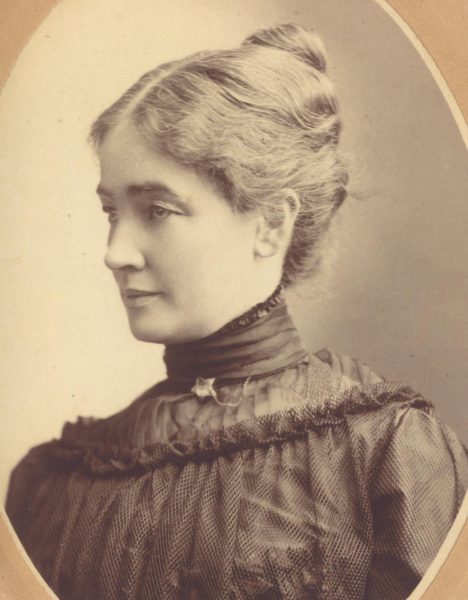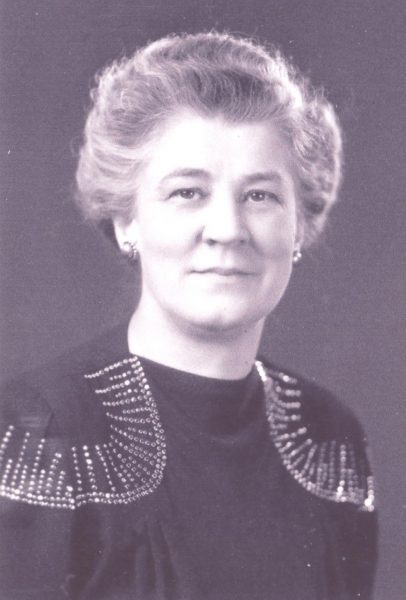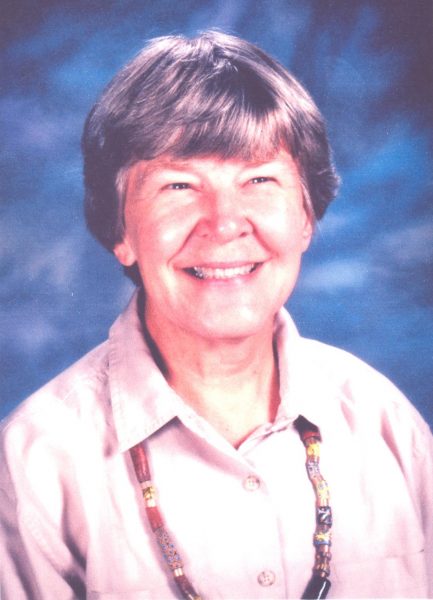More than 3,600 women have been honored by their friends and families in the Plaza of Heroines, located in front of Carrie Chapman Catt Hall on Iowa State University’s central campus.
In this issue of Voices, we are featuring women from three generations of one family with strong ties to Iowa State and a personal connection with Carrie Chapman Catt. Their biographies were contributed early in the life of the plaza, and were recently updated with the addition of photos. We chose them both for the interesting stories they tell and to remind donors that it’s never too late to submit a biography or a photo to accompany a brick or paver.
To add a biography or photo to an existing brick or paver, email the Catt Center at cattcntr@iastate.edu or mail your submission to 309 Catt Hall, Iowa State University, Ames, IA, 50011. If you are interested in purchasing a new brick or a paver, you can use our new online order form or contact the Catt Center.
Mary MacDonald Knapp

Mary MacDonald Knapp
Mary MacDonald Knapp was a personal friend of Carrie Chapman Catt. It was Catt who asked Knapp to join I.C. Sorosis (now Pi Beta Phi fraternity), though their friendship had begun before that. In later years when Catt visited the Iowa State campus, she stayed with Knapp at her home on campus and later on Ash Avenue.
Knapp was an educated woman in a time when education for women was rare. She graduated from Iowa State in science and humanities in 1883, the same year that her future husband, Herman Knapp, graduated. Knapp taught mathematics and English at Iowa State, and firmly believed that it was the duty of the college to educate all Iowans—not just those formally enrolled—to the extent such education was possible. She was helpful in organizing the Extension Service and the WOI radio station as logical extensions of the campus. She exerted an active influence on Iowa State and actively supported women’s organizations that encouraged education and independence for women.
The value of a good education for women as well as for men is a strong legacy that she left her family. All of her four children attended Iowa State and three graduated, as well as many of her grandchildren.
Knapp’s biography was submitted by her grandchildren, who say, “We are grateful and proud of the heritage she has left us.”
Jeannette Knapp Stoddard

Jeannette Knapp Stoddard
Jeannette Knapp Stoddard was born and raised on the Iowa State campus. She grew up as one of the “campus kids,” the children of administrators and faculty living on campus, which was isolated from the city of Ames by a mile of open fields.
Stoddard graduated from Iowa State, where she was a member of Pi Beta Phi, Sigma Alpha Iota musical honorary and Mortar Board. She taught school in Tipton, IA, and then returned to Iowa State in the chemistry department. In 1918, she married Alexis Erling Stoddard, a graduate of Iowa State and veteran of World War I.
Stoddard was well-loved and well-respected in the community. Tall, dignified and stately, she was always thoughtful and encouraging of others. To her, nothing was impossible. Stoddard believed firmly that people should develop their interests and abilities and she encouraged this in others. Kindness and thoughtfulness were her trademarks. She knew how to draw out the best in people, and her home was always open to visitors. Stoddard strongly believed in education, especially for women.
She had a beautiful soprano voice, and sang as a soloist for the Methodist and Presbyterian churches.
Carrie Chapman Catt was a personal friend of the family, and her influence encouraged Stoddard to develop her independence as a woman. She learned to drive her own horse and then her car, and drove a great deal. Stoddard was proud of her vote. She believed in the potential that women have and she encouraged women to extend themselves.
Stoddard’s biography was submitted by her daughter, Mary Jean Stoddard Fowler, who says that her mother’s ideas, interests and convictions provided the guideposts for her own life.
Mary Jean Stoddard Fowler

Mary Jean Stoddard Fowler
Mary Jean Stoddard Fowler graduated from Iowa State in 1956 with a B.S. in home economics and applied arts; she received her master’s degree in 1957. Her ties to Iowa State and her dedication to education are deeply rooted in her family history.
Fowler successfully combined her love of art and her dedication to education to promote art to people of all ages. After graduating from Iowa State, she taught applied art as a specialist in the extension division of the University of Wisconsin and later was an instructor in the home economics departments of the University of Iowa and the University of Houston. In addition, she served for 15 years on the board of governors for Arrowmont School of Arts and Crafts in Gatlinburg, TN. She also taught art at St. Johns School in Houston, TX, and in the high school summer program at Rice University.
Fowler saw the need and the opportunity to enhance art in education and to improve the quality of school art programs. She developed seminars and workshops for public school teachers to incorporate a wider variety of media in their programs. She presented workshops for educators’ conventions and worked with individual school districts. Her book, “Happy Inkle Trails,” details using and designing on the inkle loom.
Fowler is a practicing artist working in a variety of media, including fiber paper and paint. She has exhibited and sold as an owner/partner at Archway Gallery, and in one-woman and multiple-artist shows throughout Texas and the nation. Her works have been commissioned by individuals and corporations throughout the United States.
Fowler’s biography was submitted by her children, who noted that their mother “succeeded in incorporating art into life in such a way that others can apply it and enjoy it as she has.”